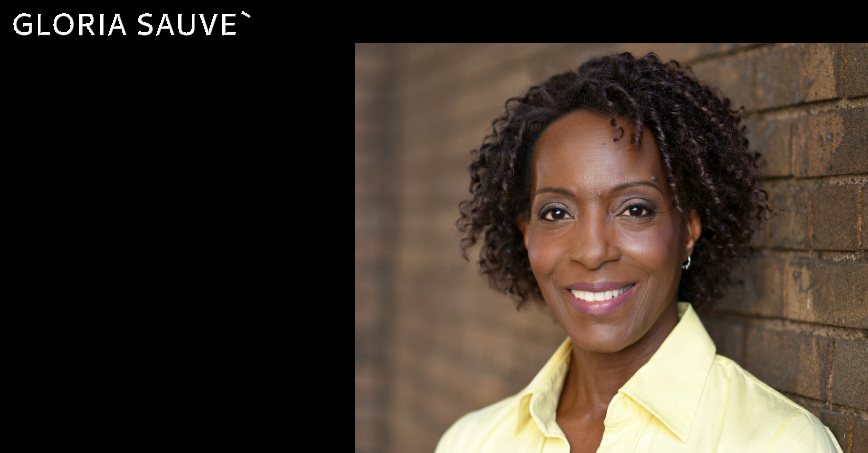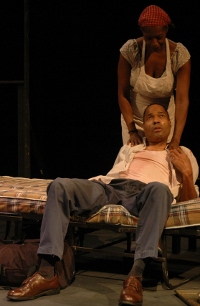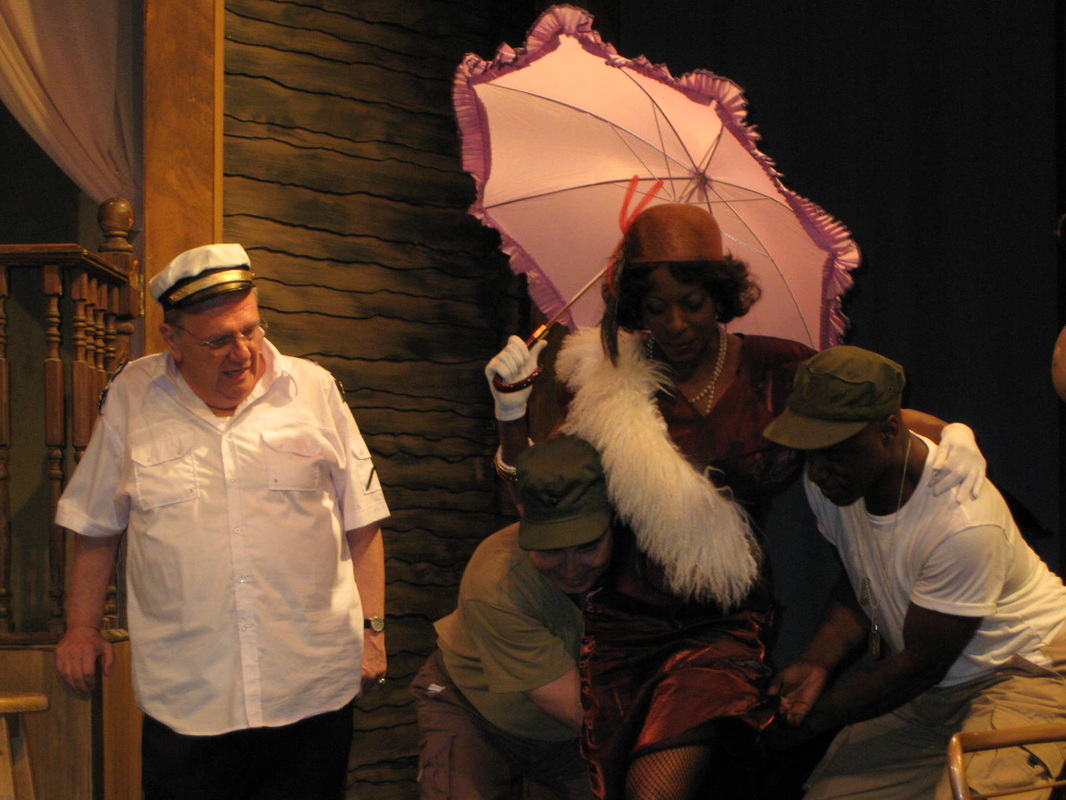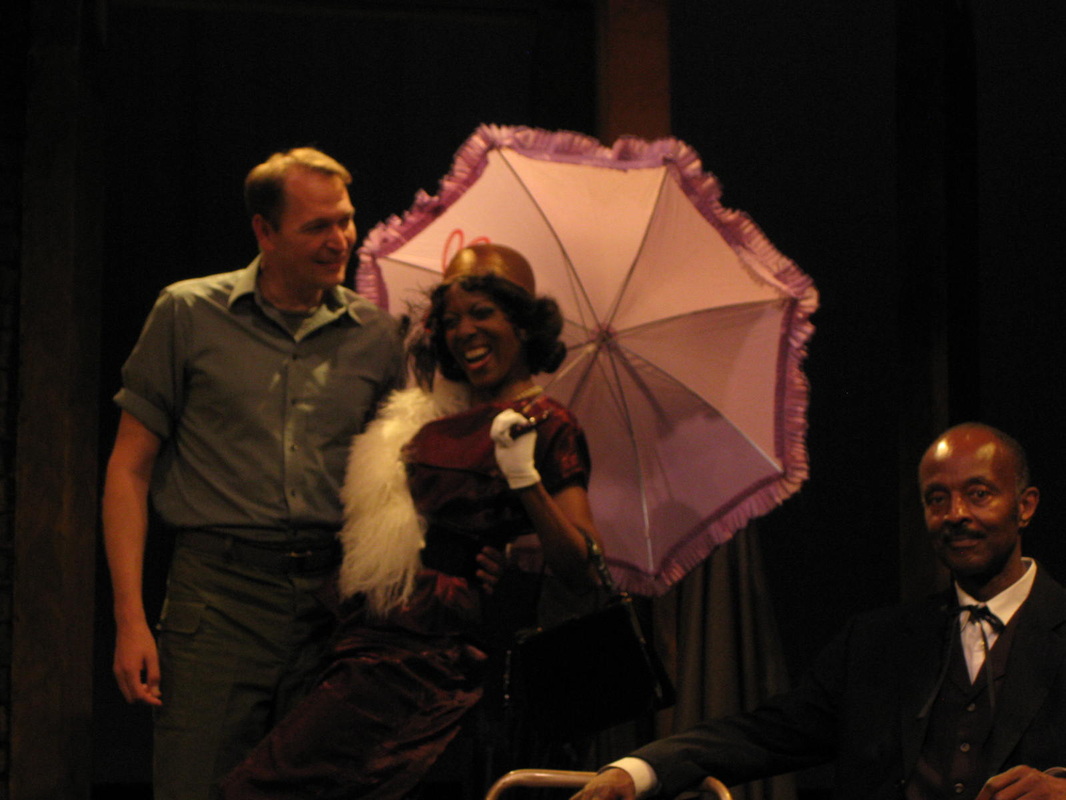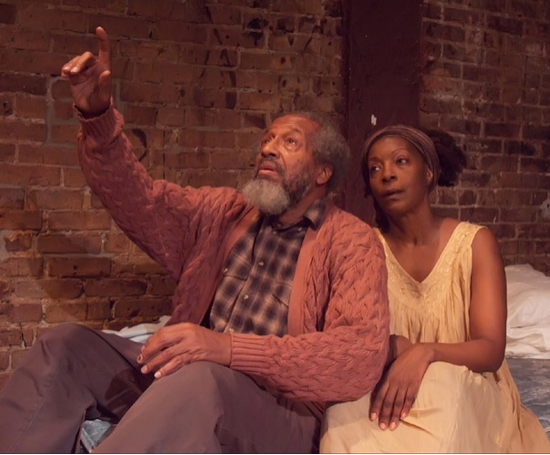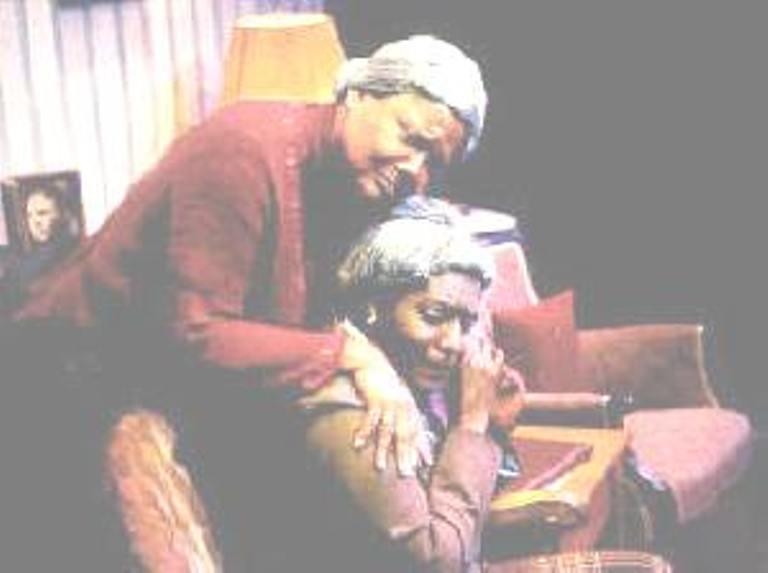|
DEEP ARE THE ROOTS
Pictured: Gloria Sauve and J.M. McDonough in a scene from Deep Are the Roots
With Deep Are the Roots, Metropolitan Playhouse once again proves itself invaluable by showing theatergoers a vivid piece of their past in that most immediate and visceral of environments—that is, on the intimate stage of their cozy East Village theatre. Artistic director Alex Roe and his gifted collaborators haven't reached back as far as they usually do: this play by Arnaud d'Usseau and James Gow was written in 1945, when it was a sizeable (and controversial) hit on Broadway. It's very much the kind of play they don't seem to write anymore—an "issue" play, wearing its sensationalism on its sleeve and possessed of an earnest sense of purpose. d'Usseau and Gow cannily present these various perspectives as they tell the story of the first week following Brett's victorious homecoming from the War. Alice wants Brett to go to the University of Chicago on a scholarship she's arranged for him. Roy wants Brett to become principal of the local segregated "colored" school. Nevvie wants Brett to be with her. The Senator wants Brett and all those like him to disappear. Michael Hardart's direction is generally quite effective, stalling just a bit during the talky middle act, which possibly could benefit from some pruning for it is very repetitious. J.M. McDonough as the tough, irascible old Senator; Gloria Sauve as Brett's mother Bella, a woman of incalculable strength and dignity; Deep Are the Roots was a hot potato in its time; it ran more than a year, but there was no film version and certainly no tour to the cities of the American South. Recalling that—and the fact that this was only a couple of generations ago—gives immense weight to the experience you'll have at Metropolitan Playhouse, where a small but significant piece of the American Past, via its drama, is being brought to life. reviewed by Martin Denton · March 8, 2012 Gloria Sauvé fills every moment she has as Bella, reaching her peak in a cutting speech to Alice about the sexual double standard for men and women.
HELLO OUT THERE
|
THE BOOK OF LAMBERT
The Book of Lambert Leslie Lee's play about six characters who live underneath the subway is painfully dated. By Patrick Lee • Feb 16, 2009 • New York City
http://www.theatermania.com/new-york-city-theater/reviews/02-2009/the-book-of-lambert_17596.html The playwright has assigned a dominant trait or problem to each of his six characters; it's no wonder that they register as types rather than as believable flesh and blood people. There's Otto (Arthur French) who has gone blind and his wife Zinth (Gloria Sauve) who, despite otherwise displaying world-weathered toughness, is gripped by a seemingly delusional compulsion to repeat their wedding vows on a daily basis. The quality of the acting is highly variable, as is the performance style. HAVING OUR SAY
WASHINGTON POST
Washington, DC Wednesday Feb 25 2004 THE DELANY SISTERS, SAYING IT WITH VERVE By Tricia Olszewske Sauvé make a delightful little old lady, not only realistically looking like centenarians, carrying herself with verve occasionally punctuated by frailty. The actresses also display a playful and sometimes deft chemistry, indicating age-old sisterly competition with a lightning-quick glower or smooth recovery from a potentially embarrassing stumble. When Sauvé accidentally refers to her companion as Bessie, for example, Robinson interrupts with “but I’m Sadie!” Sauvé’s perfect comeback? “I’m getting old, what can I say!” Sauvé make a delightful little old lady, not only realistically looking like centenarians, carrying herself with verve occasionally punctuated by frailty. The actresses also display a playful and sometimes deft chemistry, indicating age-old sisterly competition with a lightning-quick glower or smooth recovery from a potentially embarrassing stumble. When Sauvé accidentally refers to her companion as Bessie, for example, Robinson interrupts with “but I’m Sadie!” Sauvé’s perfect comeback? “I’m getting old, what can I say!” http://ww2.gazette.net/gazette_archive/2004/200407/entertainment/perfarts/201065-1.html
Cherish the ladies: Delany sisters have their say at OTC Feb. 12, 2004 Chris Slattery Staff Writer Before there was reality television, there was plain old reality. Often, it was static, mindless and boring -- but sometimes reality was so compelling and incredible, it could be used to make best-selling books and critically acclaimed theatrical performances. The lives of Miss Sadie and Dr. Bessie Delany were like that: two sisters whose father was born into slavery but became America's first black Episcopal bishop; whose mixed-race mother was born free, and who (along with all eight siblings) grew up to be college-educated, successful professionals. "They were incredible ladies," says Gloria Sauvé, method actor and veteran of film and television, including the "Law and Order" television series. At Olney Theatre Center for the Arts, Sauvé plays Dr. Bessie Delany, one of the world's first female dentists, in the theatrical adaptation of the sisters' biography "Having Our Say." "I want to do them justice, and I think we do," she says. Sauvé, lately of the Emmy-nominated HBO mini-series "The Corner," is new to OTC, where "Having Our Say," directed by Halo Wines, runs through March 21. She's not new to the Delanys, though -- few people are since 1993, when the sisters, along with Amy Hill Hearth, turned their oral history into a best-selling book. |
MA RAINEY'S BLACK BOTTOM
THE ADVOCATE
Baton Rouge, La Wednesday, October 1, 2003 SWINE PALACE HANDLES POWERFUL DRAMA OF “MA RAINEY’ WITH SKILL, RESPECT By Laurie Smith Anderson GLORIA SAUVE has both the talent and the nerve to play a convincing diva. Her rendition of “Ma Rainey’s Black Bottom,” from which came the black Bottom dance, is a sultry pleasure. “You don’t sing (the blues) to feel better,” she says. “You sing because that’s a way of understanding life.” Her character was dominant. |
|
